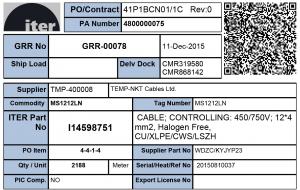Managing the needles in the haystack
Pipe spool 2D-2002-20 will soon be making the voyage from the port of Hazira, India to the ITER site, packed into a container filled with material destined for the buried installation of part of ITER's cooling water system. Similar shipments will be sent regularly from India over the next year—in all, some 180 containers containing over a thousand individual spool references and associated equipment.
When the material arrives on site it will be inspected and then assigned a location in one of ITER's storage areas. At some stage of on-site work—as field contractors refer to detailed technical drawings to plan for the next installation sequences—they will call for this specific reference, which must be released to them on time in order to avoid any delay in construction. This scenario will be repeated in every arena of ITER construction throughout the assembly and installation phase; depending on construction needs, hundreds of items will be released every day from storage and positioned on the platform to be integrated into the ITER machine or plant.
With thousands of annual deliveries and millions of coded products stored in facilities both on and off site, it couldn't be done without a sophisticated materials management system.
"The major challenge of a project like ITER—with such a huge quantity of material and an execution period that will last much longer than industry average—is managing the timeliness of component deliveries in relation to construction need-dates," says Aaron Shaw, who joined the project just over a year ago as Logistics, Storage & Materials Engineer. "It's a gargantuan task."
Having the items on site a minimum of 90 days before their need dates—properly labelled and stored—is a process that begins at least 18 months before delivery. Aaron is working now with the ITER Domestic Agencies and the system technical responsible officers to collect as much information as possible on priority work packages. This includes product information from the supplier (deliverables, identification tags, serial numbers, product characteristics), provisional schedules, drawings, and corresponding ITER reference numbers. Closer to delivery, the data per shipment is further refined to include specific packing lists and shipping information, details which allow him to begin planning storage facility space.
"Materials management takes place behind the scenes," says Aaron. "When everything is running smoothly you don't hear about it ... it's only when things go wrong that you do. Good materials management begins with correct data. At this early stage of ITER assembly and installation, we are setting up the systems and processes and making sure they work."
Jean-Daniel Delaplagne, data management engineer, has been instrumental in this most recent development. All the material data is now crosslinked so that the components are correctly identified, warehoused and properly assigned to construction. "What seemed like a fairly straightforward process at the beginning—developing a portal to bulk upload data to SmartPlant® Materials—turned out to be quite challenging in the end," admits Jean-Daniel. "Tailoring the materials data to the correct business process information and creating a tool to allow the validation and crosschecking of many heterogeneous sources was not simple."
The procuring Domestic Agencies (or their suppliers) fill in the information once only and it serves both the ITER Organization and the company planning the international logistics, DAHER. The data is uploaded from the portal to SmartPlant® Materials and automatically linked to the ITER scheduling tool Primavera and the Daher logistics information system DAgeSCOPE™, providing the equipment material data required for construction and assembly needs and acting as a one-stop shop for all information related to ITER material deliveries. "The collaborative portal helps us to avoid duplication of effort," says Aaron. "In my business construction is king—we have to make sure that no delay is incurred because of materials mismanagement."
"Bulk" items, such as valves and cables, will be categorized differently in the materials database than unique items, which correspond to a unique location in the plant or machine and for which no substitutions can be accepted. Data entered well ahead of shipment will also allow storage reservations to be planned according to product requirements (indoor/indoor temperature controlled/sensitive materials storage/outdoor). At the peak of assembly activities, it is estimated that the ITER Organization will need at least 50,000 m² of storage space, meaning that the Facilities, Logistics & Materials group will be managing a number of off-site facilities.
"With SmartPlant® Materials, ITER now has a robust material management system in place," concludes Aaron. "The use of the supplier portal will help in having a 'single source of truth,' centralizing material data collection from Domestic Agencies, linking to other databases, aiding in construction planning, and automating processes. As we move forward, it will be a precious aid to logistics, warehousing and construction activities."



